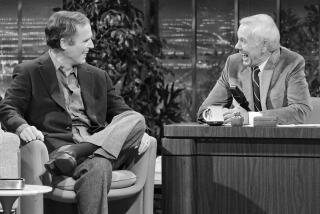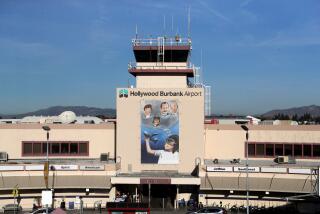Burbank City Council Ties Airport Project to Curfew
- Share via
BURBANK — Taking its toughest stance yet against plans for a new, larger terminal, the Burbank City Council has moved to block the long-sought expansion of Burbank Airport until federal officials impose a mandatory curfew on all flights, giving nearby residents relief from jet noise.
For the first time, the council tied the multimillion-dollar terminal project to tougher restrictions on night and early-morning flights.
The airport now has a voluntary curfew on commercial flights departing Burbank from 10 p.m. to 7 a.m. that is regularly ignored by two airlines, Southwest and United.
Upping the stakes on the two most controversial aspects of airport operations, four of the council’s five members directed the city’s three airport commissioners to veto any efforts to finance a new terminal--and to take any other actions needed to stop the project--until a mandatory curfew takes effect.
“What you witnessed is the citizens of Burbank taking back control of the future of the airport,” said new Councilman Bob Kramer.
Airport officials have pressed for years to build a new terminal that would meet current federal safety regulations and accommodate the sharp surge in air travelers who choose Burbank as a convenient alternative to Los Angeles International and other local airports.
In 1994, 4.8 million passengers used Burbank Airport, which averages 180 commercial flights a day. Annual passenger levels are projected to reach 5.4 million in 1998 and 10 million in 2010.
The terminal project called for two phases of expansion. The first was to nearly triple the size of the 163,000-square-foot building by 1998, adding five aircraft gates to the current 14. The second was to add 205,000 square feet of space and eight aircraft gates by 2010.
Without the larger terminal, airport spokesman Victor Gill warned, the facility will grow even more crowded during peak hours of operation, and may even prompt airlines to schedule flights around the clock to cope with consumer demand.
The council’s action Thursday, said Carl W. Raggio Jr., president of the Burbank-Glendale-Pasadena Airport Authority, pushes the first stage of the terminal project “into the next century.”
In the past four years, the Federal Aviation Administration reports, no airport in the country has completed all the documents required under federal law for a mandatory curfew.
Completing the entire application process, airport officials say, is expected to take up to two years.
“What happens if the FAA denies that? Have we lost two more years? Then what does Burbank do?” Raggio asked.
“Burbank has effectively played a role here to put anything in the way of progress to a halt, and I’m sorry to see that,” he added. “My personal feeling is they’re shutting the door on their partners,” the cities of Glendale and Pasadena.
The reaction of Airport Commissioner Chris Holden of Pasadena was succinct.
“At what point does the Airport Authority stop being the whipping boy for the Burbank City Council?” Holden asked.
The Burbank-Glendale-Pasadena Airport Authority, which oversees the airport’s operations, is made up of nine commissioners--three from each city. With a two-thirds vote of the delegation from each city required before debt can be incurred, each city has the power to veto proposals to finance major projects at the airport, such as acquiring land for the proposed new terminal.
On Friday, all three of Burbank’s representatives--Philip E. Berlin, Margie A. Gee and Ingolf Klengler--pledged to carry through with the council’s directive.
“By the City Council speaking as they did,” Berlin said, “there isn’t any question where the City Council sits on the direction it wants the authority to go.”
One question that remains is whether the council will require more before it backs the project. Kramer, for example, has called for the Airport Authority to fulfill three other conditions:
* Develop a 20-year master plan for the facility that outlines specific plans for the new terminal.
* Complete further studies on the impacts of aircraft noise over Burbank neighborhoods.
* Provide proof from the Federal Aviation Administration that the current terminal must be moved farther away from one of the runways to satisfy federal safety regulations.
The council will vote July 25 on a written policy outlining its official position on all airport issues, including the mandatory curfew.
Expressing hesitation about the action Thursday was council member Bill Wiggins, who supports the first phase of airport expansion, as well as a mandatory curfew.
He said it may be virtually impossible to hold off on all planning while the request for a curfew is being processed. “Somewhere down the road--while this application is being put together over the next two years--the concept of a new terminal is going to come into play.”
Representatives for United and Southwest airlines, which ignore Burbank’s voluntary curfew by offering flights from 6 a.m. to 7 a.m. most days, said those flights will continue until there is a mandatory curfew or passenger counts drop.
Having no new terminal for several years, they added, will affect the airlines’ ability to expand at Burbank Airport, but it is too soon to tell by how much.
“There seems to be some obvious turmoil on the part of the three cities and the Airport Authority as to what is in the best interest of the consumers and residents,” said Southwest’s Linda Burke-Rutherford. “We’re in a wait-and-see mode.”
More to Read
Sign up for Essential California
The most important California stories and recommendations in your inbox every morning.
You may occasionally receive promotional content from the Los Angeles Times.













